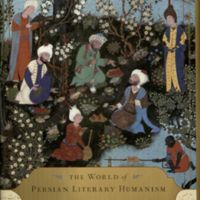The World of Persian Literary Humanism
Dublin Core
Title
The World of Persian Literary Humanism
Subject
Persian literature -- History and criticism
Humanism in literature
Humanism in literature
Description
Humanism has mostly considered the question "What does it mean to be human?" from a Western perspective. Dabashi asks it anew from a non-European perspective, in a groundbreaking study of 1,400 years of Persian literary humanism. He presents the unfolding of this vast tradition as the creative and subversive subconscious of Islamic civilization.
What does it mean to be human? Humanism has mostly considered this question from a Western perspective. Through a detailed examination of a vast literary tradition, Hamid Dabashi asks that question anew, from a non-European point of view. The answers are fresh, provocative, and deeply transformative. This groundbreaking study of Persian humanism presents the unfolding of a tradition as the creative and subversive subconscious of Islamic civilization. Exploring how 1,400 years of Persian literature has taken up the question of what it means to be human, Dabashi proposes that the literary subconscious of a civilization may also be the undoing of its repressive measures. This could account for the masculinist hostility of the early Arab conquest that accused Persian culture of effeminate delicacy and sexual misconduct, and later of scientific and philosophical inaccuracy. As the designated feminine subconscious of a decidedly masculinist civilization, Persian literary humanism speaks from a hidden and defiant vantage point--and this is what inclines it toward creative subversion. Arising neither despite nor because of Islam, Persian literary humanism was the artistic manifestation of a cosmopolitan urbanism that emerged in the aftermath of the seventh-century Muslim conquest. Removed from the language of scripture and scholasticism, Persian literary humanism occupies a distinct universe of moral obligations in which "a judicious lie," as the thirteenth-century poet Sheykh Mosleh al-Din Sa'di writes, "is better than a seditious truth."
What does it mean to be human? Through a detailed examination of a vast literary tradition, Hamid Dabashi asks that question anew, from a non-European point of view. The answers are fresh, provocative, and deeply transformative.
What does it mean to be human? Humanism has mostly considered this question from a Western perspective. Through a detailed examination of a vast literary tradition, Hamid Dabashi asks that question anew, from a non-European point of view. The answers are fresh, provocative, and deeply transformative. This groundbreaking study of Persian humanism presents the unfolding of a tradition as the creative and subversive subconscious of Islamic civilization. Exploring how 1,400 years of Persian literature has taken up the question of what it means to be human, Dabashi proposes that the literary subconscious of a civilization may also be the undoing of its repressive measures. This could account for the masculinist hostility of the early Arab conquest that accused Persian culture of effeminate delicacy and sexual misconduct, and later of scientific and philosophical inaccuracy. As the designated feminine subconscious of a decidedly masculinist civilization, Persian literary humanism speaks from a hidden and defiant vantage point--and this is what inclines it toward creative subversion. Arising neither despite nor because of Islam, Persian literary humanism was the artistic manifestation of a cosmopolitan urbanism that emerged in the aftermath of the seventh-century Muslim conquest. Removed from the language of scripture and scholasticism, Persian literary humanism occupies a distinct universe of moral obligations in which "a judicious lie," as the thirteenth-century poet Sheykh Mosleh al-Din Sa'di writes, "is better than a seditious truth."
What does it mean to be human? Through a detailed examination of a vast literary tradition, Hamid Dabashi asks that question anew, from a non-European point of view. The answers are fresh, provocative, and deeply transformative.
Creator
Hamid Dabashi
Publisher
Cambridge, Mass. : Harvard University Press
Table Of Contents
Introduction: the making of a literary humanism -- The making of an Iranian world in an Islamic universe: the rise of Persian language and literature (632-750) -- The Persian presence in the Abbasid empire: resisting Arabic literary imperialism (750-1258) -- The prose and poetry of the world: the rise of literary humanism in the Seljuqid empire (1038-1194) -- The triumph of the word: the perils and promises of the Mongol empire (1256-1353) -- The lure and lyrics of a literature: the center and periphery of the Timurid empire (1314-1508) -- The making of a literary cosmopolitanism: treading over multiple empires (1501-1732) -- The dawn of new empires: literary humanism in search of itself (1736-1924) -- The final frontiers: new Persian literary humanism (1906-present) -- Conclusion.
Text Item Type Metadata
Original Format
Book
Citation
Hamid Dabashi, “The World of Persian Literary Humanism,” Humanities Hub, accessed February 28, 2026, https://humanitieshub.sdsu.edu/omeka/items/show/1164.

